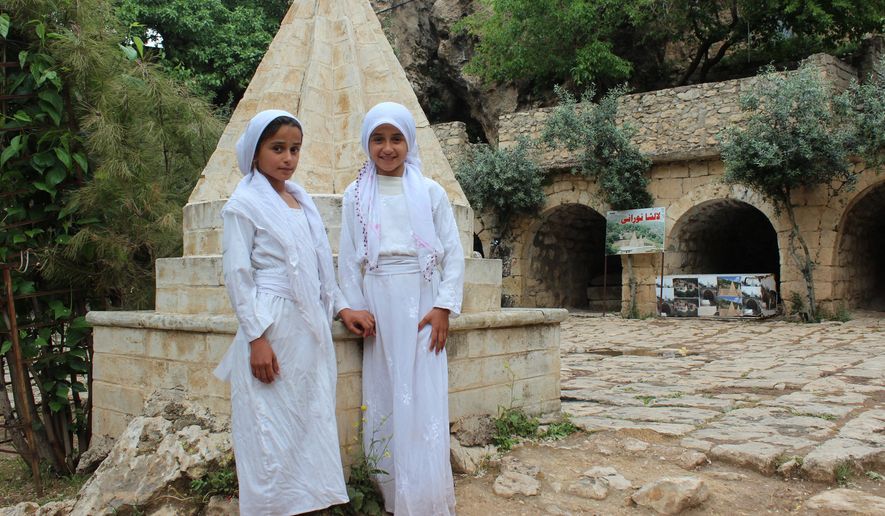Kurdistan: A proven sanctuary and ‘safe haven’ for refugees
 Yezidi girls. (Photo Credit: Kurdistan Iraq Tours LLC/Tour Guide.)
Yezidi girls. (Photo Credit: Kurdistan Iraq Tours LLC/Tour Guide.)
By Robert A. Destro and Carole A. O’Leary – – Wednesday, July 26, 2017
The people and regional government of Iraqi Kurdistan have long played a vital role in protecting Christians, Yazidis and all religious minorities. Muslims and non-Muslims alike are free to practice their religion openly in the Kurdistan Region of Iraq.
Of equal importance, since the Islamic State (ISIS) took over large areas of northern Iraq in 2014, the Kurdistan Regional Government (KRG) has provided vital security and assistance to almost 2 million internally displaced Iraqis and Syrian refugees — mainly Christians, but also Yazidis, and others.
Reflecting on the important role of the KRG, His Excellency Bashar Matti Warda, the Chaldean Archbishop of Erbil, stated that: “During the darkest points of the crisis, the KRG, and in particular the leadership, showed great solidarity with us, attending Christmas Mass with us, stating publicly that we would live here together or die here together.”
His Excellency added that: “The most important thing the KRG did for us during the crisis was to respect us and show that our people had value in the fabric of the social community.”
Currently, the KRG is providing sanctuary for an estimated 1.8 million refugees and IDPs:
— Some 250,000 of these are refugees from Syria, and the rest are IDPs from within Iraq.
— One in five people in the Kurdistan Region are IDPs or refugees.
— In Dohuk, the smallest province in Iraqi Kurdistan and the most affected, the ratio in some villages between locals and IDPs or refugees is 1:1.
According to the World Bank and the KRG Ministry of Planning, as of September 2015, the KRG spent approximately USD $1 billion to meet the needs of the internally displaced population, including health services, water, electricity, security and protection, education and camp management and camp monitoring.
Prior to 2003, the Christian population of Iraq is thought to have been as high as 1.5 million. Today, their numbers are between 300,000 and 450,000, with most of the population, according to Christian sources, residing or seeking refuge in Iraqi Kurdistan.
In summer 2014, some 120,000 Christians fled in terror from the biblical lands of Mosul and the Plains of Nineveh, as ISIS threatened them with “conversion” or death. On August 7, 2014, they arrived in Ainkawa, the Christian Quarter of Erbil. Exhausted, fearful and hungry, these Christians turned to their churches and to the KRG for medical care, shelter and food.
Of Iraq’s 600,000 Yezidis, today more than 400,000 have found shelter within the borders of the Kurdistan Region.
Now engaged in the final battle to liberate Mosul City, the Kurdistan Region’s military — the Peshmerga — which includes Christian and Yazidi units, has been continuously fighting the Islamic State since 2014.
To be clear, the only way to effectively protect Christians and other religious minorities from ISIS and like-minded groups is for the U.S. and international community to support the KRG in its continued efforts to protect religious freedom and provide vital services to 1.8 million IDPs and refugees.
Therefore, members of Congress and the Trump administration should:
i. Declare that the Kurdistan Region of Iraq is a “safe haven,” where all religious minorities targeted by ISIS are protected;
ii. Designate other areas of Iraq — such as the Nineveh Plain — as “safe havens,” where religious and ethnic minorities targeted by ISIS can return to their homes, be protected and, if they wish, begin their lives anew;
iii. Witness and record the evidence of genocide perpetrated on the Yazidis, Christians, the Shabak and other religious minorities;
iv. Visit Iraqi Kurdistan to see what the KRG has accomplished to protect Christians and other religious minorities who have sought refuge in Iraqi Kurdistan from throughout Iraq and Syria.
v. Recognize that the KRG cannot do this alone. The continued protection and welfare of IDPs and refugees in the Kurdistan Region — including Christians and other religious minorities — depends on the support of the American people and their representatives in Congress.
Today, the Kurdistan Region of Iraq is truly a “safe haven” for religious minorities, internally displaced Iraqis and Syrian refugees threatened by the Islamic State and other extremist groups.
The people of Iraqi Kurdistan have proved their resilience in the face of extreme challenges since 2014. 2017 will be no less difficult, and Kurdistan needs its American friends now, more than ever. The KRG cannot continue to do this alone.
• Robert A. Destro and Carole A. O’Leary are the co-directors of the Iraqi Kurdistan Religious Freedom Project, a joint initiative of Michael Moran & Associates and the Interdisciplinary Program in Law & Religion of the Columbus School of Law at The Catholic University of America.
http://www.washingtontimes.com/news/2017/jul/26/kurdistan-a-proven-sanctuary-and-safe-haven-for-re/
